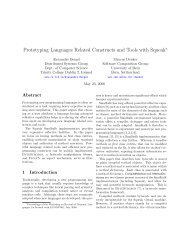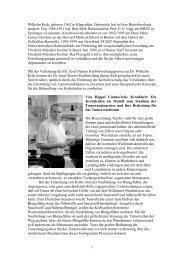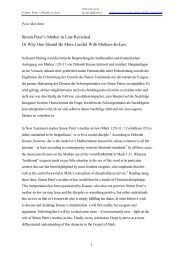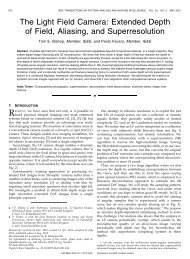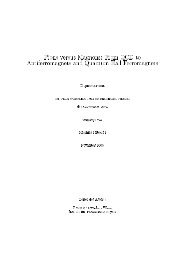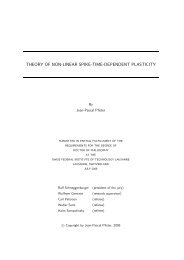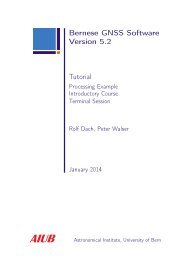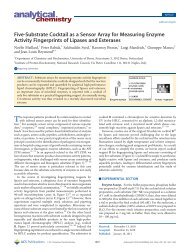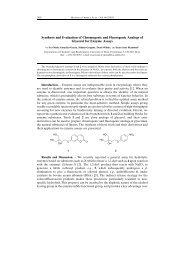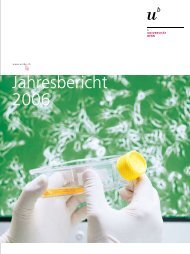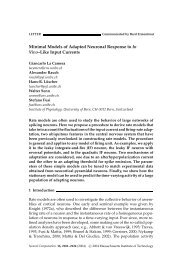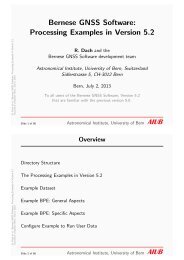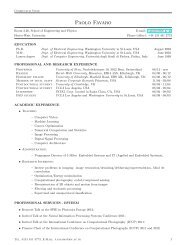You also want an ePaper? Increase the reach of your titles
YUMPU automatically turns print PDFs into web optimized ePapers that Google loves.
<strong>Gaelic</strong> <strong>Words</strong> <strong>in</strong> <strong>English</strong><br />
Franz Andres Morrissey, Bern 12.3.2013<br />
Disclaimer<br />
In 2006 I did a programme for Radio RaBe on the <strong>Gaelic</strong> language and its <strong>in</strong>fluence on<br />
<strong>English</strong>. The follow<strong>in</strong>g word lists represented the raw material for what was an <strong>in</strong>formal,<br />
rather chatty hour of radio conversation. As there was no academic purpose beh<strong>in</strong>d all of this,<br />
I failed to make a list of the sources, but any search with the search terms “<strong>Gaelic</strong>” and<br />
“<strong>English</strong>” will throw up very similar results to the ones listed below.<br />
I am <strong>in</strong>debted to www.gaelic.ca (a Canadian website dedicated to <strong>Gaelic</strong> <strong>in</strong> general and to<br />
Novia Scotia <strong>Gaelic</strong> <strong>in</strong> particular), but a good if somewhat chaotic source that covers a lot of<br />
the ground of what is presented <strong>in</strong> the follow<strong>in</strong>g – and more – is<br />
http://www.smo.uhi.ac.uk/gaidhlig/cananan/beurla/faclan.html. This is a page on the website<br />
of Sabhal Mòr Ostaig, the only <strong>Gaelic</strong> Medium tertiary <strong>in</strong>stitution <strong>in</strong> Scotland.<br />
One of the sites I used at the time was http://www.gaelic.ca/language/words.htm, which<br />
featured the work of Ken MacK<strong>in</strong>non and is unfortunately no longer accessible. However,<br />
Ken MacK<strong>in</strong>non himself and his work is well worth seek<strong>in</strong>g out (http://www.sgrud.org.uk/).<br />
In the f<strong>in</strong>al analysis, hence the need for this disclaimer, I do not claim any of the follow<strong>in</strong>g<br />
data to have been collected by me personally and many of the views stated are commonly<br />
held by much more conscientious scholars work<strong>in</strong>g <strong>in</strong> this field.<br />
<strong>Gaelic</strong> words <strong>in</strong> Scots<br />
Scots or Scottish <strong>English</strong> is perhaps the first place to look for <strong>Gaelic</strong> words com<strong>in</strong>g <strong>in</strong>to<br />
<strong>English</strong>; unfortunately quite a number of these words are unfamiliar outside Scotland:<br />
– Dule or dool, as a noun signify<strong>in</strong>g grief or distress, or as an adjective mean<strong>in</strong>g sad or<br />
sorrowful, comes from the <strong>Gaelic</strong> noun “doilgheas” (sorrow, affliction) and the adjective<br />
“duilich” (difficult, sorry, grievous).<br />
– Keelie (a rough young man, a tough) and gillie (an attendant to a sport hunter/fisher on a<br />
Highland estate) derived from “gille” (a lad, a young man, a servant).<br />
– Sassenach (an <strong>English</strong> person) from Sasunnach.<br />
Other Scots words like these can be cited, as <strong>in</strong> the two lists that follow; note that words <strong>in</strong><br />
italics are topographical and that even of the rema<strong>in</strong><strong>in</strong>g ones descibe features visible on the<br />
land:<br />
<strong>English</strong> / Scots Scottish <strong>Gaelic</strong><br />
(Gàidhlig)<br />
<strong>English</strong> /Scots Scottish <strong>Gaelic</strong><br />
(Gàidhlig)<br />
brae bràighe caber cabar<br />
burn bùrn caddie cadaidh<br />
clachan clachan cailleach cailleach<br />
claddach cladach cairn càrn<br />
corrie coire cateran ceatharn
<strong>English</strong> / Scots Scottish <strong>Gaelic</strong><br />
(Gàidhlig)<br />
<strong>English</strong> /Scots Scottish <strong>Gaelic</strong><br />
(Gàidhlig)<br />
craig/crag creag claymore claidheamh-mór<br />
crannog crannag creel criol<br />
glen gleann dochandoris deoch an dorus<br />
island <strong>in</strong>nis dornick doirneag<br />
knock cnoc dour dùr<br />
kyles caolas gloam<strong>in</strong> glòma<strong>in</strong>n<br />
l<strong>in</strong>n l<strong>in</strong>n <strong>in</strong>gle (<strong>in</strong>glenook) a<strong>in</strong>geal<br />
loch loch kail càl<br />
machar machair keech cac<br />
ross ros oxter achlais<br />
strath srath reel righil<br />
tack (leased farm) tac skean sgian<br />
weem uamh sneck (latch) sneag<br />
bannock bonnach soutar sutair<br />
bothy bothan spunk spong<br />
braw brèagha swap suaip<br />
breeks briogais whisky uisge-beatha<br />
brogue (as bròg w<strong>in</strong>nock u<strong>in</strong>neag<br />
footware)<br />
BACK TO TOP<br />
<strong>English</strong> words from <strong>Gaelic</strong><br />
Some words entered directly <strong>in</strong>to <strong>English</strong>, without necessarily first becom<strong>in</strong>g widely used <strong>in</strong><br />
Lowland Scotland (many of these are 20th century borrow<strong>in</strong>gs):<br />
“<strong>English</strong>” <strong>Gaelic</strong> <strong>English</strong> <strong>Gaelic</strong><br />
ceilidh céilidh skiff (of snow) sgiobhag<br />
grot, grotty grod slug (a swig) sluig<br />
philabeg feileadh-beag smash<strong>in</strong>g is math s<strong>in</strong><br />
pibroch piobaireachd sporan sporan<br />
shoo/shoot (i.e. go<br />
on)<br />
siuthad twig (“understand”) tuig<br />
While a number of the above are universally recognized today by <strong>English</strong> speakers, some are<br />
known only <strong>in</strong> areas of the world where <strong>Gaelic</strong> once dom<strong>in</strong>ated (“a skiff of snow” is heard<br />
ma<strong>in</strong>ly <strong>in</strong> Nova Scotia and on Pr<strong>in</strong>ce Edward Island, Canada).<br />
Sometimes the <strong>Gaelic</strong> word, or part of it, is truncated or changed while an attempt is made to<br />
shift it <strong>in</strong>to <strong>English</strong> spell<strong>in</strong>g conventions. Sometimes the sense changes <strong>in</strong> the way that many<br />
words do, given time and general use <strong>in</strong> the language, but the po<strong>in</strong>t be<strong>in</strong>g made here is that<br />
the word orig<strong>in</strong>ated either with Gaels us<strong>in</strong>g <strong>English</strong> or <strong>English</strong>-speakers hear<strong>in</strong>g bits of <strong>Gaelic</strong><br />
be<strong>in</strong>g repeated. Sometimes a <strong>Gaelic</strong> word similar to an <strong>English</strong> one will give an added sense<br />
to the <strong>English</strong> word.
A number of other widely known words and phrases may come from either Scots or Irish<br />
<strong>Gaelic</strong>:<br />
<strong>English</strong><br />
(Goidelic) Celtic<br />
orig<strong>in</strong><br />
<strong>English</strong><br />
(Goidelic) Celtic<br />
orig<strong>in</strong><br />
bard bàrd clan clann<br />
Beltane Beallta<strong>in</strong>n clarsach (Scottish harp) clàrsach<br />
blather bladar gab,gabby,jabber,gob gab<br />
bog, boggy bog, bogach Gaeltacht Gaidhealtachd<br />
bonnyclabber ba<strong>in</strong>ne clàbar galore gu leòir<br />
(curdled milk)<br />
brat brat keen cao<strong>in</strong><br />
brisk brisg/briosc pet (favoured) peata<br />
brogue (or accent) bròg shennachie (story teller) seanachaidh<br />
carrageen (Irish<br />
moss)<br />
cairge<strong>in</strong> smidgen smid<strong>in</strong><br />
Quite a number of widely familar words of <strong>Gaelic</strong> orig<strong>in</strong> are most likely to have an Irish<br />
provenance (many of these are Anglo-Irish terms):<br />
<strong>English</strong> (Spell<strong>in</strong>g) Irish/<strong>Gaelic</strong> orig<strong>in</strong> <strong>English</strong> (Spell<strong>in</strong>g) Irish/<strong>Gaelic</strong><br />
orig<strong>in</strong><br />
banshee bean sidhe pillion pillín<br />
booley buaile pony pónai<br />
Colleen cailín poteen poitín<br />
coracle/curragh currach puss (face) pus<br />
cross cros shabeen siopín<br />
down (or low hill -<br />
dune)<br />
dún<br />
Shillelagh (a village, Co.<br />
Wicklow)<br />
dun (the colour) dun slogan sluggh-ghairm<br />
hooligan uilligán smithereens smidiríní<br />
leprechaun leipreachán Tory tórai, tóruidhe<br />
luh/lough<br />
lough<br />
As <strong>in</strong> Scotland, <strong>Gaelic</strong> names are frequently presented <strong>in</strong> Ireland <strong>in</strong> an anglicized form:<br />
Belfast has an example familiar from news broadcasts: Shankill Road from Sean-chill (old<br />
church)<br />
Cognates <strong>in</strong> <strong>Gaelic</strong><br />
F<strong>in</strong>ally, we have to deal with the hundreds of cognate words that exist because either the<br />
<strong>Gaelic</strong> languages have borrowed from <strong>English</strong> or they draw on the same <strong>in</strong>fluences (Lat<strong>in</strong>,<br />
French, etc...) or on common Indo-European roots; the follow<strong>in</strong>g examples may look like<br />
borrow<strong>in</strong>gs (<strong>English</strong> from <strong>Gaelic</strong>, or <strong>Gaelic</strong> from <strong>English</strong>) but actually they illustrate parallel<br />
extensions from common roots: compare<br />
<strong>English</strong><br />
<strong>Gaelic</strong>
aste (moisten)<br />
coaster<br />
tour<br />
baist(baptize)<br />
còrsair<br />
turus<br />
The f<strong>in</strong>al list will show some of the borrow<strong>in</strong>gs <strong>in</strong>to <strong>English</strong>, where they came from and what<br />
the orig<strong>in</strong>al mean<strong>in</strong>g was.<br />
<strong>English</strong> Irish Scots <strong>Gaelic</strong> Mean<strong>in</strong>g of <strong>Gaelic</strong><br />
airt aird aird po<strong>in</strong>ts of the compass<br />
banshee bean sí bean-sìthe woman of the fairy mound<br />
bard bard bard poet (of a certa<strong>in</strong> rank)<br />
bog bog bog soft<br />
brogue bróg bròg shoe, boot<br />
bun bun bun base, bottom “She says he has cute buns.”<br />
caber cabar cabar pole, rafter (as <strong>in</strong> “toss<strong>in</strong>g the caber”)<br />
cairn carn càrn heap, pile<br />
carrageenan carraigín carraigean Irish moss seaweed (food thickener &<br />
emulsifier e.g. <strong>in</strong> yogurt)<br />
cateran ceathairne peasantry<br />
clan clan clann children, l<strong>in</strong>eage<br />
claymore claíomh claidheamh great sword<br />
mór mór<br />
crag creig creag rocky outcrop<br />
Colleen cailín (caileag) girl<br />
dig, twig tuig tuig understand<br />
dulse duileasc duileasg edible seaweed<br />
galore go leor gu leòr plenty, enough<br />
gillie giolla gille lad, servant<br />
glen glean gleann valley<br />
glom glám glam grab, clutch (as <strong>in</strong> “glom onto it”)<br />
keen cao<strong>in</strong> cao<strong>in</strong> weep, lament<br />
kibosh caidhp báis cap of death (“put the kibosh on that plan”)<br />
loch loch loch lake<br />
pet peata peata tame animal<br />
phony fá<strong>in</strong>ne fà<strong>in</strong>ne r<strong>in</strong>g (from the gilt brass r<strong>in</strong>g used by sw<strong>in</strong>dlers)<br />
pibroch piobaireachd pip<strong>in</strong>g (pib = pipe)<br />
pillion pillín pillean small pad, cushion<br />
plaid pluid plaide blanket<br />
poteen poitín little pot, moonsh<strong>in</strong>e<br />
shamrock seamróg seamrag shamrock<br />
shanty seantigh seann taigh old house<br />
shebeen síbín illicit whiskey; speakeasy<br />
shillelagh sail éille cudgel on a thong<br />
slew slua sluagh host, multitude ('to have a slew of th<strong>in</strong>gs to do')<br />
slob slaba mud, ooze; slovenly person<br />
slogan sluagh ghairm call to the multitude<br />
smash<strong>in</strong>g 's math s<strong>in</strong> that is good<br />
smithereens smidiríní (smid) little bits<br />
sporran sparán sporran purse
<strong>English</strong> Irish Scots <strong>Gaelic</strong> Mean<strong>in</strong>g of <strong>Gaelic</strong><br />
Tory tóraí tòraiche pursuer; robber; bandit<br />
trouser triús triubhas trews; pants<br />
whiskey uisce<br />
(beatha)<br />
uisge (beatha) water (of life)<br />
A f<strong>in</strong>al remark<br />
The number of Celtic words <strong>in</strong> <strong>English</strong> is perhaps somewhat larger than might be assumed<br />
when one considers that generally the powerless language is more likely to borrow from the<br />
dom<strong>in</strong>ant language, <strong>in</strong> other words that more <strong>English</strong> words would appear <strong>in</strong> <strong>Gaelic</strong> than the<br />
other way around. However, given the fact that <strong>English</strong> has borrowed heavily from many<br />
other languages <strong>in</strong>clud<strong>in</strong>g French the reservoir for Celtic borrow<strong>in</strong>gs needs to be seen as<br />
be<strong>in</strong>g someone bigger than one might expect. Clearly there are borrow<strong>in</strong>gs from the brick<br />
Brythonic Celtic languages, i.e. Welsh and Cornish, but through French also Breton and<br />
Gaulish would have provided a reservoir for borrow<strong>in</strong>gs. As the list above have shown,<br />
however, many of these are so deeply embedded <strong>in</strong> what is now considered the <strong>English</strong><br />
vocabulary that they are no longer recognised as borrow<strong>in</strong>gs from Celtic languages.



